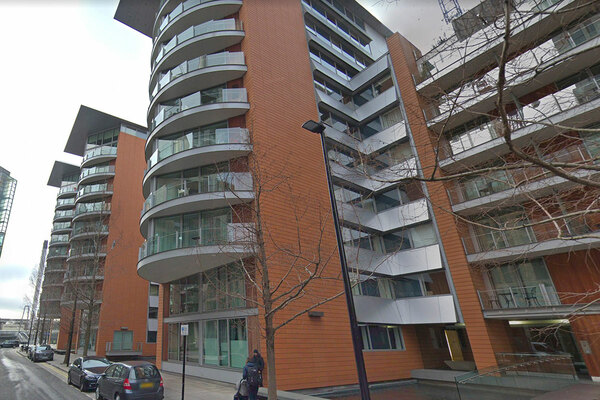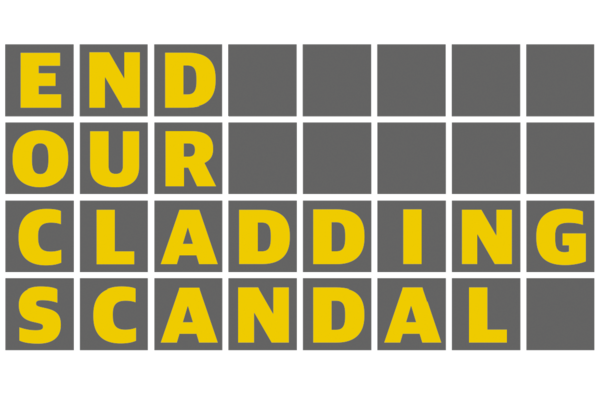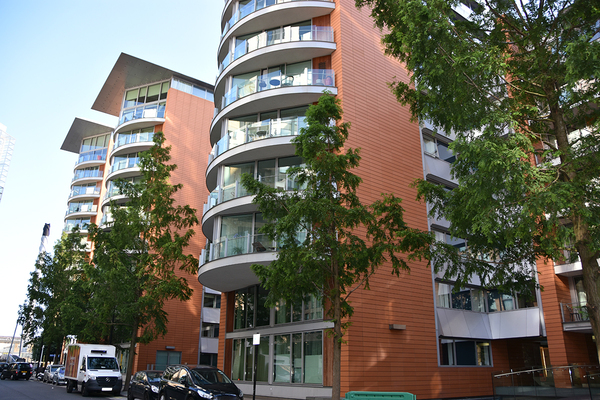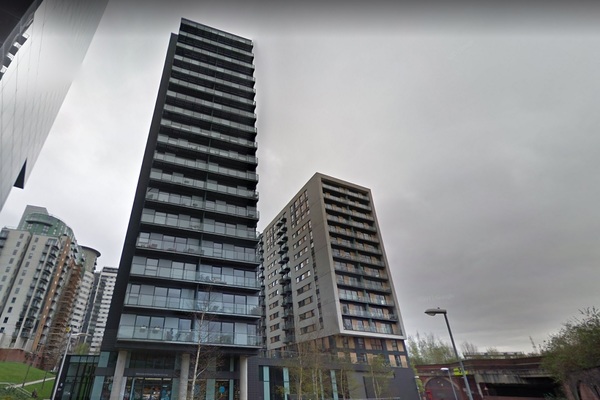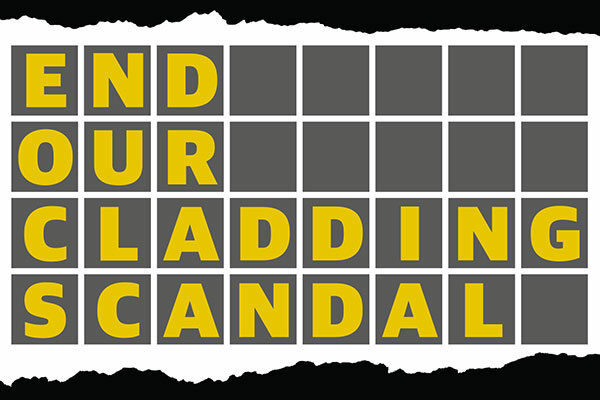Leaseholders in London block pay nearly £3.5m for Grenfell-style cladding removal
Leaseholders living at a major development in central London have been forced to pay out millions of pounds to remove dangerous Grenfell-style cladding despite no work starting on the block, Inside Housing can reveal.
Despite repeated ministerial pledges that leaseholders will be protected from the bills, residents at the Paddington Walk development have already paid nearly £3.5m in service charges for the removal.
Residents across the blocks now face an additional bill of £5.4m to cover fire safety work, which could mean some residents paying out tens of thousands of pounds each. They have been told by the development’s building management company, Paddington Walk Management, that work cannot begin until it receives all the money to fund the work.
Paddington Walk was built in 2005 by European Land and Property, a joint venture development company owned by the billionaire Reuben Brothers and fellow developer the Jarvis family.
Contractor Carillion was chosen as the builder in 2005 but famously went into liquidation in January last year, owing an estimated £7bn to its supply chain.
The revelations come despite repeated calls by the government that developers and freeholders should protect leaseholders from the cost of re-cladding and assurances that “it will not rule anything out” for those companies that don’t.
In a letter sent by housing minister Kit Malthouse in mid-February to the Housing, Communities and Local Government Committee, he said the government was unaware of any buildings where leaseholders have been forced to pay for re-cladding.
Inside Housing has seen a letter from the lawyers representing Paddington Walk Management that states residents risk losing their homes if the money is not paid.
A resident of the block, who preferred not to be named, told Inside Housing: “We are being hit by increasing fees and claims for interest on sums of money that they are insisting on collecting in advance, without even a final schedule of works or a start date.”
They added: “We feel completely abandoned by the government.”
It has also emerged that housing association Peabody is also on the hook for a hefty remediation bill as the head lessee for two of the blocks holding the development’s affordable housing. Peabody secured the lease for the two blocks, Montgomery Court and Montgomery House, under a Section 106 agreement.
Despite the government setting up a £400m fund to pay for re-cladding on social housing blocks, social landlords are still liable for the many homes they own in private developments. According to documents seen by Inside Housing, upwards of 90% of the £3.5m fund has already been collected from leaseholders. Private leaseholders expected to fund 69% of the total fee, with Peabody funding nearly 27%. The remaining money is expected to come from leaseholders of commercial units in the development. The service charge amount demanded in the legal letter sent by the management company includes interest due to late payment, as well as a bill for the management company’s legal costs. The re-cladding bills come on top of money residents have spent on interim fire safety measures, including a £21,000-a-week waking watch service and £263,000 for the installation of an internal alarm system.
Pressure is ramping up on the government to take action and speed up the remediation of dangerous cladding from private blocks and protect leaseholders from the large bills.
Last week Inside Housing teamed up with residents’ groups from affected blocks to launch the #EndOurCladdingScandal campaign.
European Land and Property has developed much of the Paddington Basin area where Paddington Walk sits, including the Merchant Square and Canalside Walk developments.
The current building owner is Paddington Walk Ltd, which shares directors with Paddington Walk Management Ltd. Both companies also list European Land and Property co-owner Bruce Jarvis as a director.
In addition to the presence of aluminium composite material cladding, a recent survey of the buildings found a litany of other fire safety issues including missing fire breaks, air gaps, between windows and panels, and combustible insulation.
An MHCLG spokesperson said: “Ensuring the safety of those still living in buildings with ACM cladding is of the utmost priority.
“Due to the lack of progress, the government is looking at a range of new additional measures to get building owners to do the right thing and get on with it.”
Paddington Walk Ltd said it was unavailable to provide a response.
End Our Cladding Scandal: campaign aims
- Government provides a fund to cover the cost of cladding removal and remedial works on private blocks
- A firm timescale is set out of no more than two years for the work to be carried out
- Residents are reimbursed for the interim fire safety costs incurred, and funding is to be provided for necessary internal fire safety measures identified by a competent fire risk assessor
- Martin Hilditch, editor, Inside Housing
- Manchester Cladiators
- UK Cladding Action Group
- Natasha Elcock, chair, Grenfell United
- Sadiq Khan, mayor of London
- Kate Henderson, chief executive, National Housing Federation
- Terrie Alafat, chief executive, Chartered Institute of Housing
- Andy Burnham, Mayor of Greater Manchester
- Lord Gary Porter, chair of the Local Government Association
- Polly Neate, chief executive, Shelter
- Jane Duncan, chair of the expert advisory group on fire safety, RIBA
- Andy Dark, assistant general secretary of the Fire Brigades Union
- Christina McAnea, assistant general secretary, UNISON
- Sir Peter Bottomley, Conservative MP and chair of the All-Party Parliamentary Group on Leasehold and Commonhold Reform
- Jim Fitzpatrick, Labour MP, and member of All-Party Parliamentary Group on Leasehold and Commonhold Reform
- Mark Amesbury, shadow employment minister and Labour MP for Weaver Vale
- Emma Dent Coad, former Labour MP for North Kensington
- Lucy Powell, Labour MP for Manchester Central
- Rushanara Ali, Labour MP for Bethnal Green and Bow
- George Howarth, Labour MP for Knowsley
- Graham Stringer, Labour MP for Blackley and Broughton
- Rob Ellis, presenter, Capital FM
- John Biggs, mayor of Tower Hamlets
- Paul Dennett, mayor of Salford
- Suzanne Richards, councillor and executive member for housing and regeneration on behalf of all Manchester's Labour Councillors
- Sir Richard Leese, Labour councillor and leader Manchester City Council
- John Leech, Manchester Liberal Democrat leader on behalf of all Manchester’s Liberal Democrat councillors
- Darren Rodwell, executive member for housing at London Councils and leader of Barking and Dagenham Council
- George Clarke, TV Architect
- David Walker, bishop of Manchester
- Graham Tomlin, bishop of Kensington
- John Roberts, founder of AO.com
- Josh Beaumont, professional rugby player, Sale Sharks and resident of affected building
- Bill Beaumont, former England rugby captain
- Jeremy Dyson, co-founder of the League of Gentlemen
- Andy Moss, actor who has appeared on Channel 4’s Hollyoaks and resident
- Ross Mullan, actor who has appeared in Game of Thrones
- Get Cape Wear Cape Fly, musician
- Nour-eddine Aboudihaj, spokesperson for Justice4Grenfell
- Mike Leonard, chief executive, Building Alliance
- Kate Kendrick, founder, National Leasehold Campaign
- Martin Boyd, chair, Leasehold Knowledge Partnership
- Paula Higgins, chief executive, HomeOwners Alliance
- Mark Henderson, chief executive, Home Group
- Ben Clay, founding member of the Tenants Union
- Hilda Palmer, acting chair of the Hazards Campaign
- Susan Bright, professor of law, University of Oxford
- Gill Kernick, consultant and former Grenfell Resident
- Phil Murphy, fire safety expert and tower block resident
This list will be updated. Please email peter.apps@insidehousing.co.uk if you want to support the campaign
- Terrie Alafat, chief executive of the Chartered Institute of Housing, added: “It is shocking that out of the 176 private blocks with dangerous cladding that have been identified since Grenfell, only 10 have had the necessary safety work completed. While the government has pledged to fund the replacement of dangerous cladding in the social housing sector, there is no such promise for residents in private flats, which is why we are supporting Inside Housing’s new campaign to change this now.”
Kate Henderson, chief executive of the National Housing Federation said: "It should go without saying that everyone must be safe in their own home.
"But dangerous cladding has been used on tower blocks of all tenures across the country because government fire safety regulations were not fit for purpose. The government must now take financial responsibility for ensuring that each and every home affected, no matter who owns it, is made safe and fast.”
- Jane Duncan, chair of the Expert Advisory Group on Fire Safety at the Royal Institute of British Architects, said: “It is appalling that nearly two years on from the Grenfell Tower tragedy there are still buildings with cladding systems that have been identified as a risk to public safety. This must be rectified with immediate effect and individuals should not face financial hardship because of a past failure in regulation.”
Suzanne Richards, executive member for housing and regeneration at Manchester City Council, said: “I have heard first-hand the stories from residents about how living in a block that is not deemed fire safe can impact on their emotional health and well-being.
“On top of this they have the additional worry of the threat of bills, of up to £80,000 in some cases, landing on their doormat.
“This is unacceptable and government must now step in and fund post-Grenfell remediation works.”
Paula Higgins, chief executive of the HomeOwners Alliance, said: “Cladding has not been removed because freeholders and warranty providers do not want to take responsibility. These homeowners are stuck in a void with no end in sight.
“Government needs to bang heads together and find a solution quickly because these people have been sold a duff product. If no one will take responsibility then government must step in and take action to protect people urgently.”
Andy Dark, assistant general secretary of the Fire Brigades Union, said: “It’s a scandal that residents who are living in tower blocks covered in flammable cladding and where basic fire safety is substandard have no certainty whatsoever that their homes will be made safe.
“Whether publicly or privately owned, the remedial work needs to be completed quickly and the government must take responsibility for getting the job done.”
Martin Boyd, chair of the Leasehold Knowledge Partnership, said: “It has taken far too long for government to take action to remove dangerous cladding from thousands of people’s homes.
“This has always been either the fault of regulations or the failing of the developer but nobody seems willing or able to challenge either group.”
Jim Fitzpatrick, Labour MP for Poplar and Limehouse and co-chair of the All-Party Parliamentary Group on Leasehold and Commonhold Reform, said: “No one should be left in the position of having worked and saved for years to become a property owner, to then learn – through no fault of their own – their home is no longer safe.
“This campaign rightly highlights the consequences of inaction and I urge the government to take responsibility as a matter of urgency.”
John Biggs, mayor of Tower Hamlets said: “I fully support the campaign from Inside Housing calling on the government to fully fund all works needed to remove dangerous cladding from all housing blocks.
“Ministers have rightly said their top priority must be to ensure that people are safe in their own homes, and it is entirely unfair to expect residents to find tens of thousands of pounds to fund this without any help whatsoever.”
Rushanara Ali, Labour MP for Bethnal Green and Bow, said: “It is outrageous that two years after the Grenfell disaster there are still 40,000 leaseholders across the UK who are stuck living in unsafe blocks with dangerous cladding.
“The government must move fast to replace flammable cladding on every building, no matter who owns it, and must do it now.”
- David Walker, bishop of Manchester, said: "In Manchester and beyond, many months after the Grenfell tragedy, too many people are still living in apartments that do not adequately protect them against fire. Many are now faced with five figure bills to make good the deficiencies, and find their homes have become practicably unmortgageable. I applaud the efforts of Manchester Cladiators to bring together residents and others who share their concerns. The challenge is simple, to get developers, freehold owners and government to step up to the plate and accept responsibility for urgently rectifying this scandalous state of affairs."
